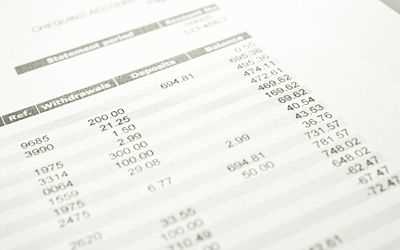Bank Statement: Definition, Benefits, and Requirements
A bank statement is a document provided by a bank or financial institution that provides a summary of the transactions and account balances for a specific period of time. It is an essential tool for managing personal or business finances.
Definition
Benefits
Bank statements offer several benefits for individuals and businesses:
- Account Monitoring: Bank statements allow account holders to monitor their transactions and account balances. This helps in identifying any errors or fraudulent activities.
- Budgeting and Financial Planning: By reviewing bank statements, individuals can track their expenses and income, helping them to create budgets and plan their financial goals.
- Proof of Income: Bank statements can serve as proof of income for individuals who are self-employed or do not have traditional pay stubs.
- Tax Documentation: Bank statements can be used as supporting documents for tax purposes, providing evidence of deductible expenses and income.
- Loan Applications: Lenders often require bank statements as part of the loan application process to assess the borrower’s financial stability and repayment ability.
Requirements for Obtaining a Bank Statement
To obtain a bank statement, individuals or businesses typically need to meet the following requirements:
- Have an active bank account with the financial institution.
- Provide proper identification, such as a valid ID or passport.
- Submit a request to the bank, either in person, through online banking, or via phone.
- Specify the desired period for the bank statement, usually monthly or quarterly.
- Pay any applicable fees, if required by the bank.
What is a Bank Statement?
Bank statements are an essential tool for individuals and businesses to keep track of their financial activities. They provide a detailed record of all transactions, allowing customers to reconcile their accounts and ensure that their records match those of the bank.
Bank statements can be obtained in various formats, including paper statements that are mailed to the customer’s address, electronic statements that are accessed online, or even mobile banking apps that provide real-time updates.
Bank statements are not only useful for personal financial management but also for various other purposes. For example, when applying for a loan or mortgage, lenders often require bank statements as proof of income and financial stability. Similarly, businesses may need to provide bank statements to potential investors or partners to demonstrate their financial health.
In summary, a bank statement is a vital document that provides a comprehensive overview of a customer’s financial transactions. It helps individuals and businesses manage their finances effectively, verify their account balances, and provide evidence of their financial status when needed.
The Benefits of Bank Statements

A bank statement is a document provided by a bank to its customers that shows the details of their financial transactions. It is an essential tool for managing personal finances and offers several benefits to account holders.
Here are some of the key benefits of bank statements:
- Budgeting: By analyzing the information on a bank statement, individuals can create a budget and allocate their funds accordingly. Bank statements help in identifying areas where expenses can be reduced and savings can be increased.
- Proof of Income: Bank statements serve as proof of income for individuals who are self-employed or freelancers. It provides a detailed record of their earnings, which can be useful when applying for loans, mortgages, or other financial transactions.
- Tax Purposes: Bank statements can be used as supporting documents when filing taxes. They provide a clear record of income, expenses, and other financial activities, making it easier to calculate and report accurate tax information.
- Identifying Errors or Fraud: Regularly reviewing bank statements allows individuals to identify any errors or fraudulent activities. It helps in detecting unauthorized transactions and taking immediate action to resolve the issue.
- Financial Planning: Bank statements provide valuable information about an individual’s financial health and can be used for long-term financial planning. They help in setting financial goals, monitoring progress, and making informed decisions about investments and savings.
Requirements for Obtaining a Bank Statement
- Identification: The first requirement is to have a valid form of identification. This can be a government-issued ID card, passport, or driver’s license. The bank needs to verify the identity of the individual requesting the bank statement.
- Account Information: The bank will require specific information about the account in order to generate the bank statement. This includes the account number, account type (such as savings or checking), and any other relevant details.
- Request Method: Banks may have different methods for requesting a bank statement. Some banks allow customers to request it online through their internet banking portal, while others may require individuals to visit a branch in person or contact customer service.
- Fee: Depending on the bank and the specific request, there may be a fee associated with obtaining a bank statement. This fee can vary and may be waived for certain account holders or under specific circumstances.
It is important to note that the process of obtaining a bank statement may take some time, especially if it needs to be mailed or if the bank has specific procedures in place. It is advisable to check with the bank beforehand to understand the exact requirements and any additional steps that may be necessary.
Overall, a bank statement is a valuable document that provides individuals with a detailed record of their financial transactions. By fulfilling the necessary requirements, individuals can easily obtain their bank statement and use it for various purposes such as budgeting, tax filing, and financial planning.

Emily Bibb simplifies finance through bestselling books and articles, bridging complex concepts for everyday understanding. Engaging audiences via social media, she shares insights for financial success. Active in seminars and philanthropy, Bibb aims to create a more financially informed society, driven by her passion for empowering others.
